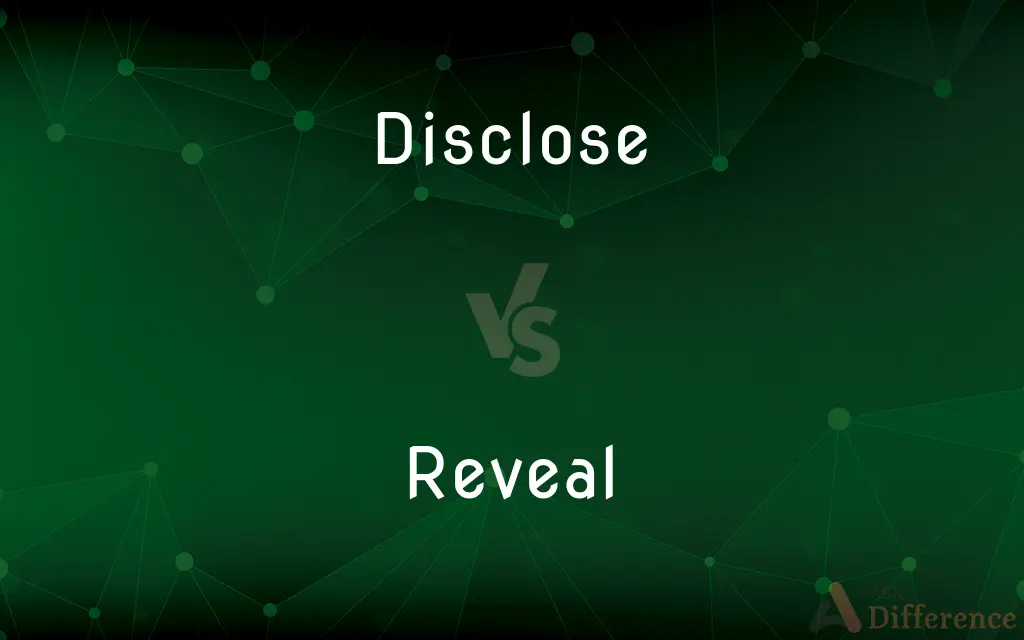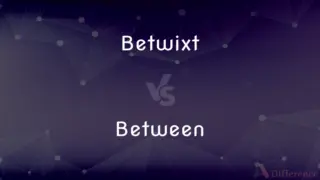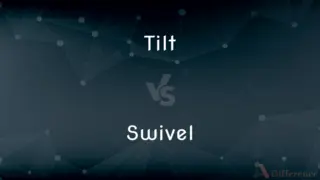Disclose vs. Reveal — What's the Difference?
By Tayyaba Rehman & Maham Liaqat — Updated on April 4, 2024
Disclose often implies a formal or official act of making something known, while reveal can suggest a more gradual or personal unveiling of information.

Difference Between Disclose and Reveal
Table of Contents
ADVERTISEMENT
Key Differences
Disclose is typically used in contexts where information is made known officially or formally, often carrying a sense of obligation or duty. For instance, companies are required to disclose financial information to their shareholders, emphasizing the procedural aspect of making information known. On the other hand, reveal is used more broadly and can refer to the act of making something known that was previously hidden or unknown, not necessarily bound by formal obligations. It often carries a connotation of surprise or discovery, as in revealing a secret.
While disclose is often associated with the sharing of specific, often sensitive or regulated information, reveal can encompass a wider range of scenarios, including personal, dramatic, or unexpected disclosures. This distinction is notable in legal or corporate settings, where the term disclose is preferred to denote the formal sharing of information under specific conditions or regulations.
Disclose can also imply a more deliberate process of making information known, suggesting a controlled release of information. This is contrasted with reveal, which can imply an unintentional or accidental disclosure, highlighting the differences in intentionality behind the two terms.
The context in which each term is used can greatly affect its connotation. For example, disclosing one's financial status to a regulatory body has a much different connotation than revealing a personal secret to a friend. This highlights how the perceived seriousness or formality of the information being shared can influence the choice between disclose and reveal.
Despite their differences, both terms share a common core of making previously unknown information known to others. This underlying similarity underscores the nuanced nature of language and communication, where the choice of words can subtly influence the interpretation of actions.
ADVERTISEMENT
Comparison Chart
Connotation
Formal, official
Personal, sometimes surprising
Contexts
Legal, corporate, official
Broad, including personal and dramatic scenarios
Intentionality
Often deliberate
Can be unintentional or accidental
Regulation
Associated with obligations, regulations
No inherent regulatory connotation
Usage
Preferred in formal settings
Wider usage in various contexts
Compare with Definitions
Disclose
To reveal; to expose to view.
The report disclosed the true cost of the project.
Reveal
To display or exhibit something.
The museum’s new exhibit will reveal artifacts from the ancient city.
Disclose
To inform (someone) about a fact.
The doctor disclosed the test results to the patient.
Reveal
To make known something that was previously secret or unknown.
The author revealed the ending in the last chapter.
Disclose
To make (secret or new information) known.
The company disclosed its plans for the new product.
Reveal
To bring to light; to uncover.
The investigation revealed the network's illegal activities.
Disclose
To uncover; to provide access to something hidden.
The archaeologists disclosed an ancient tomb.
Reveal
To show or unveil something.
The curtain rose to reveal the set of the play.
Disclose
To make public; to reveal formally.
Celebrities sometimes have to disclose personal information for legal reasons.
Reveal
To disclose or uncover something hidden.
A quick search revealed the document’s location.
Disclose
Disclose were a Japanese punk rock band from Kōchi City, heavily influenced by Discharge. Their sound heavily replicates Discharge's style, with an increased use of fuzz and distortion guitar effects.
Reveal
To make known (something concealed or unknown)
She revealed that she was pregnant. The study revealed the toxic effects of the pollutant.
Disclose
To expose to view, as by removing a cover; uncover.
Reveal
To cause to be seen; show
The curtains parted, revealing a ballerina. The x-ray revealed a broken bone.
Disclose
To make known (something heretofore kept secret).
Reveal
To make known by supernatural or divine means
"For the wrath of God is revealed from heaven" (Romans 1:18).
Disclose
To open up, unfasten.
Reveal
The making known of an important, secret, or salient occurrence, such as the revealing of a major development, plot twist, or visual effect in a movie
"Seeing [the Wiz] in human form in the first act diminishes the power of the reveal in the second" (Bob Verini).
Disclose
(transitive) To uncover, physically expose to view.
Reveal
The part of the side of a window or door opening that is between the outer surface of a wall and the window or door frame.
Disclose
(transitive) To expose to the knowledge of others; to make known, state openly, reveal.
Reveal
The whole side of such an opening; the jamb.
Disclose
(obsolete) A disclosure.
Reveal
The framework of a motor vehicle window.
Disclose
To unclose; to open; - applied esp. to eggs in the sense of to hatch.
The ostrich layeth her eggs under sand, where the heat of the discloseth them.
Reveal
The outer side of a window or door frame.
Disclose
To remove a cover or envelope from;; to set free from inclosure; to uncover.
The shells being broken, . . . the stone included in them is thereby disclosed and set at liberty.
Reveal
A revelation; an uncovering of what was hidden in the scene or story.
The comedian had been telling us about his sleep being disturbed by noise. Then came the reveal: he was sleeping on a bed in a department store.
Disclose
To lay open or expose to view; to cause to appear; to bring to light; to reveal.
How softly on the Spanish shore she plays,Disclosing rock, and slope, and forest brown!
Her lively looks a sprightly mind disclose.
Reveal
(transitive) To uncover; to show and display that which was hidden.
Disclose
To make known, as that which has been kept secret or hidden; to reveal; to expose; as, events have disclosed his designs.
If I disclose my passion,Our friendship 's an end.
Reveal
(transitive) To communicate that which could not be known or discovered without divine or supernatural instruction.
Disclose
Disclosure.
Reveal
To make known (that which has been concealed or kept secret); to unveil; to disclose; to show.
Light was the wound, the prince's care unknown,She might not, would not, yet reveal her own.
Disclose
Make known to the public information that was previously known only to a few people or that was meant to be kept a secret;
The auction house would not disclose the price at which the van Gogh had sold
The actress won't reveal how old she is
Bring out the truth
He broke the news to her
Reveal
Specifically, to communicate (that which could not be known or discovered without divine or supernatural instruction or agency).
Disclose
Disclose to view as by removing a cover;
The curtain rose to disclose a stunning set
Reveal
A revealing; a disclosure.
Reveal
The side of an opening for a window, doorway, or the like, between the door frame or window frame and the outer surface of the wall; or, where the opening is not filled with a door, etc., the whole thickness of the wall; the jamb.
Reveal
Make visible;
Summer brings out bright clothes
He brings out the best in her
The newspaper uncovered the President's illegal dealings
Reveal
Make known to the public information that was previously known only to a few people or that was meant to be kept a secret;
The auction house would not disclose the price at which the van Gogh had sold
The actress won't reveal how old she is
Bring out the truth
He broke the news to her
Reveal
Make clear and visible;
The article revealed the policies of the government
Reveal
Disclose directly or through prophets;
God rarely reveal his plans for Mankind
Common Curiosities
Is disclosing always formal?
While disclosing often has a formal connotation, especially in legal or corporate contexts, it can also be used in less formal scenarios.
Are there contexts where disclose and reveal are interchangeable?
Yes, in some contexts, especially informal ones, disclose and reveal can be used interchangeably, though nuances in their connotations may still apply.
Can you reveal something accidentally?
Yes, revealing something can be accidental, especially if it was meant to be kept secret or was previously unknown.
What's the difference between revealing a secret and disclosing one?
Revealing a secret can be a personal, possibly accidental act, whereas disclosing a secret often implies a more formal or obligated action.
Can revealing information lead to legal consequences?
Depending on the information and context, revealing information can lead to legal consequences, especially if it breaches confidentiality or privacy laws.
Can something be revealed without being disclosed?
Yes, something can be revealed without a formal disclosure, especially in contexts where the information becomes known through discovery or observation.
Do both terms imply prior secrecy or unknown information?
Yes, both terms generally imply making known something that was previously secret or unknown.
What does it mean to disclose information?
Disclosing information means making it known, especially formally or officially, often with a sense of duty or obligation.
What kind of information is typically disclosed?
Information that is sensitive, regulated, or requires formal acknowledgment is typically disclosed.
Do both terms require an audience?
Yes, both disclosing and revealing imply that there is an audience to whom the information is made known.
Can a company reveal financial information?
A company can reveal financial information, but the term "disclose" is more commonly used in formal or regulated contexts.
Is revealing always intentional?
Revealing can be either intentional or unintentional, depending on the context.
Can disclose be used in a personal context?
Yes, disclose can be used in personal contexts, especially when emphasizing the formality or significance of the information being shared.
Is there a legal difference between disclose and reveal?
Legally, disclose often carries specific obligations and consequences, especially regarding privacy or financial regulations, whereas reveal is less bound by legal definitions.
Is disclosing information a responsibility?
In many contexts, especially legal or corporate, disclosing information is indeed seen as a responsibility or obligation.
Share Your Discovery

Previous Comparison
Betwixt vs. Between
Next Comparison
Tilt vs. SwivelAuthor Spotlight
Written by
Tayyaba RehmanTayyaba Rehman is a distinguished writer, currently serving as a primary contributor to askdifference.com. As a researcher in semantics and etymology, Tayyaba's passion for the complexity of languages and their distinctions has found a perfect home on the platform. Tayyaba delves into the intricacies of language, distinguishing between commonly confused words and phrases, thereby providing clarity for readers worldwide.
Co-written by
Maham Liaqat













































